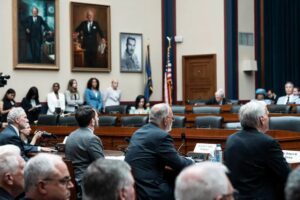
The National Interest Foundation Newsletter
Issue 293, July 18, 2025
Welcome to our NIF Newsletter. In this week’s edition, we look into how President Trump is facing debates and backlash from his Make America Great Again (MAGA) base in light of fallout over the administration’s handling of the Epstein case, examine the latest Congressional hearing featuring testimony from university leaders regarding free speech on college campuses, and discuss Israel’s continued attacks on Syria being a deliberate effort to try to destabilize the new government in Damascus.
Editor: Bassam Tarbush
Trump, Epstein, and the MAGA Debates

President Trump has vehemently defended Attorney General Pam Bondi amid the Epstein probe controversy and tried to quell the outcry from his base. (Photo from AP)
President Trump has been facing heavy backlash and debates from much of his Make America Great Again (MAGA) electoral base as a result of the notable fallout regarding the administration’s handling of the Jeffrey Epstein investigation and anticipated files release. Observers have outlined that the pushback over the issue represents one of the biggest rifts and challenges among Trump’s base of supporters since he took office for a second term back in January. Many are dissatisfied with Attorney General Pam Bondi’s assessment that the disgraced financier did not have a high-profile incriminating “client list” and regarding the nature of his death while imprisoned in 2019. This is especially a commonplace sentiment considering that members of the president’s own administration had been part of the large number of those in the MAGA world who raised serious questions about the circumstances surrounding the case and the possibility of a government cover-up. Additionally, the controversy has also been fueled by indications of internal dissent within the Trump administration, with Federal Bureau of Investigation (FBI) Deputy Director Dan Bongino believed to be one of the officials who had grown increasingly displeased with Bondi’s handling of the Epstein case because she had publicly overpromised and ultimately underdelivered disclosures about it.
The MAGA discontent has become so evident that it became a prominent matter of concern and attention at this past weekend’s Turning Point USA conservative conference in Tampa. A noteworthy number of attendees and speakers made calls for Bondi to be fired, despite Trump himself strongly defending her on social media and expressing that he wanted his supporters to move past the issue. Many of those at the summit appeared to hold viewpoints in line with that of Bongino in that they voiced frustration with Bondi’s handling of the Epstein case. During one instance, political commentator Megyn Kelly prompted the crowd to roar in support of Bongino, leading MC and head of Turning Points USA Charlie Kirk to proclaim “It’s 7,000 to 0” in reference to the backing of him over Bondi. The unease even propelled individuals within the pro-Trump MAGA movement to call for a special counsel to investigate the handling of the probe and files related to Epstein. Additionally, well-known figures connected to MAGA like Tucker Carlson have theorized that Epstein was an Israeli asset with ties to the Mossad. Thus, the Trump administration’s handling of the Epstein case has sparked debate in conservative circles regarding whether this may factor into the lackluster nature of the anticipated files release. In a speech at the Turning Point USA conference, Carlson publicly inquired about the Mossad-Epstein connection and the allegations of a relationship being part of a larger blackmail operation on behalf of Israeli intelligence, going as far as to remark that “every single person in Washington D.C. thinks that.” All of this seems to suggest that much of the base is troubled by what has unfolded in recent weeks.
There has been speculation regarding what the MAGA backlash could potentially mean come midterm elections next year. Some analysts have contended that the Trump base’s anger over the issue might depress voter enthusiasm for the president, and by extension, Republican candidates, resulting in significant losses at the ballot box. At the same time, others have tried to highlight that the midterms are still over a year away, and that therefore a host of other factors are likely to influence the electoral outcomes moving forward. Still, the clear fractures in the MAGA base about the Epstein investigation and its results serves to many as a possible political warning that would be risky to casually dismiss. Ultimately, the effect is certain to boil down to the level of staying power that the issue has and how much focus remains on it.
It has also been pointed out that the upheaval within MAGA is partly of the Trump administration’s own making. Stoked by Trump loyalists, much of the base has been fixated on the Epstein case for years, and thus the assessment put forth by Bondi was deemed unsatisfying to their expectations. The main issue is that Trump officials and allies repeatedly signaled that a lot of information was going to come out, only to then fail to deliver on this, to the dismay of many in the MAGA movement. This could very well fuel further conspiracy theories and doubts about the Epstein case among core Trump supporters, putting the administration in a difficult position regarding how to appease its base and prevent fragmentation. Top Republican officials themselves appear to be weary of the divisions over the Epstein issue, with House Speaker Mike Johnson (R-LA) joining the growing number of those urging that the Trump administration release additional files. Johnson has remarked that he is “for transparency” and that despite it being a very delicate subject, things should be put out there for people to decide. Meanwhile, Trump has largely continued to try to downplay the rifts and controversy but did state that he backs the release of any “credible” files – seemingly in an effort to placate those within his MAGA base that are disgruntled at the handling of the case.
University Leaders Testify at Latest Congressional Hearing Regarding Free Speech on College Campuses

The hearing featured university administrators from Georgetown, UC Berkeley, and CUNY. (Photo from The New York Times)
A hearing took place this week in the U.S. House Education and Workforce Committee, which saw university leaders from the three schools of Georgetown University, the University of California, Berkeley (UC Berkeley), and the City University of New York (CUNY) provide testimony and address questions posed by House lawmakers regarding free speech on college campuses. During their remarks, the university administrators touted their respective institutions’ efforts to safeguard free speech protections while at the same time ensuring the safety of students, strongly pushing back against accusations from several Republican lawmakers that not enough was done to combat antisemitism. The university officials emphasized that hateful rhetoric against Jews or any other groups was unacceptable. Activists have long lamented the wrong and dangerous attempt by some to conflate legitimate criticism of Israel with antisemitism, pointing out that it is inaccurate to label merely speaking out in support of social justice causes like Palestinian rights as somehow antisemitic. Thus, many observers have understandably highlighted that the grilling of university leaders by certain lawmakers demonstrates that these types of hearings are not sincere efforts to protect students, but instead aimed at silencing or deterring speech that sheds light on Israeli human rights violations and war crimes – something that has increasingly become a prevalent point of societal concern both on U.S. college campuses and elsewhere.
To this point, various Democratic lawmakers and others have argued that those engaging in what they deem to be performative political theater are harmfully weaponizing antisemitism as a means of attacking higher education institutions, due to these being one of the main settings where people are seeking to draw attention to contemporary injustices. The allegations of pervasive antisemitism are simply not true and have even been debunked by Jewish academia at many of these universities. In one such case, prior to Tuesday’s hearing, a group of more than 80 Jewish faculty members at UC Berkeley expressed in a letter to the House committee that they rejected the claim that the university has an “antisemitic environment.” They voiced that they felt secure on campus and supported the university administration’s efforts to balance safety with respect for free speech. Furthermore, Congressmembers berating university leaders at these hearings have been criticized by their colleagues for ignoring other forms of bigotry on college campuses. As ranking member of the House Education and Workforce Committee Bobby Scott (D-VA) was quick to outline, “I’d be remiss if I did not point out that this is our ninth hearing on antisemitism in 18 months [and that in that time] we have not held a single hearing addressing racism, xenophobia, sexism, Islamophobia or other challenges affecting other student groups on American college campuses.” For many, this shows that these hearings are being used to try and curb what is becoming more widespread free speech that is critical of Israel under the guise of “stamping out antisemitism.”
During the latest hearing, university leaders stressed the importance of protecting free speech on campuses for both students and faculty, while outlining that disciplinary action had been taken in situations that warranted it. They also alluded to the crucial role that facilitating an environment for productive dialogue and civil discourse regarding pressing contemporary issues has in the overall environment of a university, as well as the benefit of exposing students to varying viewpoints. Regrettably, some committee members like U.S. Representative Elise Stefanik (R-NY) made outlandish remarks such as calling for a CUNY law professor to be disciplined for serving as a lawyer to recently vindicated student activist Mahmoud Khalil and also attacking the university for hiring a former employee of the Council on American-Islamic Relations (CAIR) with Stefanik appallingly suggesting that the civil rights organization was “terrorist-affiliated.” However, despite attempts like this to turn the proceedings into a combative and showy spectacle, analysts largely concluded that university leaders avoided some of the major stumbles that tripped up their peers at earlier hearings.
With hearings such as the most recent one this week, it is clear to human rights and social justice activists that some lawmakers are repeatedly seeking to use the longstanding harmful tactic of conflating legitimate criticism of Israeli policies and actions with antisemitism. This form of censorship and method to try and suppress free speech related to the issue has become apparent, particularly as valid denunciation of Israel has grown in pervasiveness. It is also troubling because it disregards the diverse array of individuals who are speaking out in support of societal concerns like this, which includes many Jewish Americans themselves, in addition to citizens from various ethnic, cultural, and religious backgrounds. The overwhelming majority of those taking part in college campus solidarity movements have done so in a peaceful and civil manner, and as such, smearing these as somehow fostering a hateful or bigoted environment is wrong. All of this is made even more problematic when considering that campuses in the United States have historically been centerpieces of shaping and evolving public discourse on key contemporary societal issues, and therefore, any efforts to clamp down on organic outrage over injustice should be alarming to anyone who values the freedom of speech protections that we are entitled to as Americans.
Israel’s Continued Attacks on Syria Are a Deliberate Effort to Try to Destabilize the New Government in Damascus

Israel has repeatedly carried out attacks on Syria in recent months. (Photo from AP)
Israel has continued to launch attacks on Syria, including the capital city of Damascus, where it hit a compound this week that houses the Ministry of Defense as well as areas near the presidential palace. What was already evident as a result of repeated instances like this in recent months has only become more glaringly obvious – that this is a deliberate effort to try to destabilize the new Syrian government, undermine its legitimacy, and sow havoc and discord. Since the overthrowing of the Assad regime, Israel’s constant military attacks and intervention are plainly aimed at threatening Syria’s delicate political transition. The actions also represent a blatant violation of Syria’s territorial integrity and risk devolving into further regional conflict. With the attacks, the Israeli government is leaving no doubts regarding its desire to subvert and weaken the Syrian state, and this harmful interference in the country’s internal affairs deserves heavy condemnation.
Israeli officials have long misleadingly attempted to justify their military interventions in Syria under the guise of “protecting the Druze minority,” as was the case when they carried out a series of attacks back in May as well. However, many Druze figures have understandably accused Israel of trying to stoke divisions in order to advance its own expansionist aspirations in the region. They have also rejected any form of foreign intervention and reaffirmed their support for a unified Syrian state. For impartial observers, it is undeniable that Israel is seeking to exploit the Druze as a political tool in an effort to provide an excuse for its bellicose attacks against Syria. In actuality, these military strikes and violations of Syrian sovereignty are clearly meant to be destabilizing to the new government in Damascus. The pattern of Israeli behavior in the aftermath of the Assad regime’s ousting is proof of this and has included not only the launching of hundreds of attacks on Syria, but also the illegal seizure of a United Nations-patrolled buffer zone in Syrian territory along the border with the already unlawfully occupied Golan Heights.
The United States has even expressed its opposition to the continued Israeli attacks on Syria, with State Department officials remarking that the U.S. does not support the strikes and voicing their displeasure and concern. This is a notably differing tone from May when the United States failed to speak out against the dangerous Israeli aggression. A coalition of twelve countries in the region also issued a joint statement supporting Syria’s sovereignty and condemning foreign interference. Meanwhile, Syrian leader Ahmed al-Sharaa has denounced Israel’s actions for seeking to fracture the country, pointing to the fact that Israel has consistently targeted the new government’s stability and created discord following the fall of the former regime. In this time since last December, the transitional government in Syria has already been facing the challenge of governance and it is lamentable that after all of the suffering that Syrian citizens faced under the previous oppressive regime, Israel is attempting to derail the prospect of stability and perpetuate conflict in the region.
